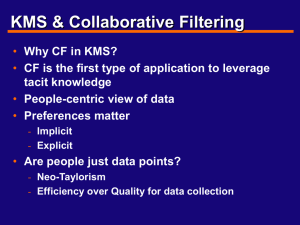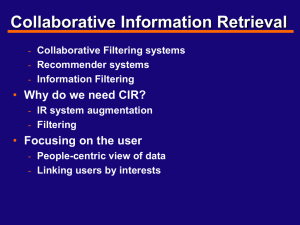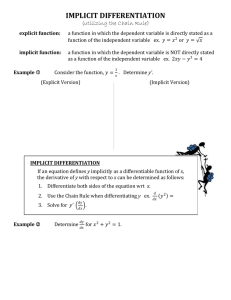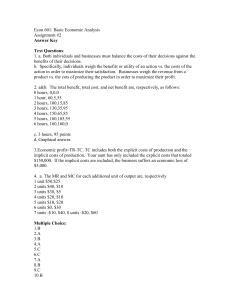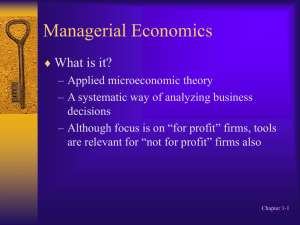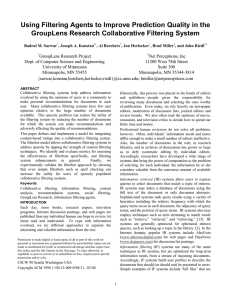Collaborative Filtering Recommender Systems
advertisement
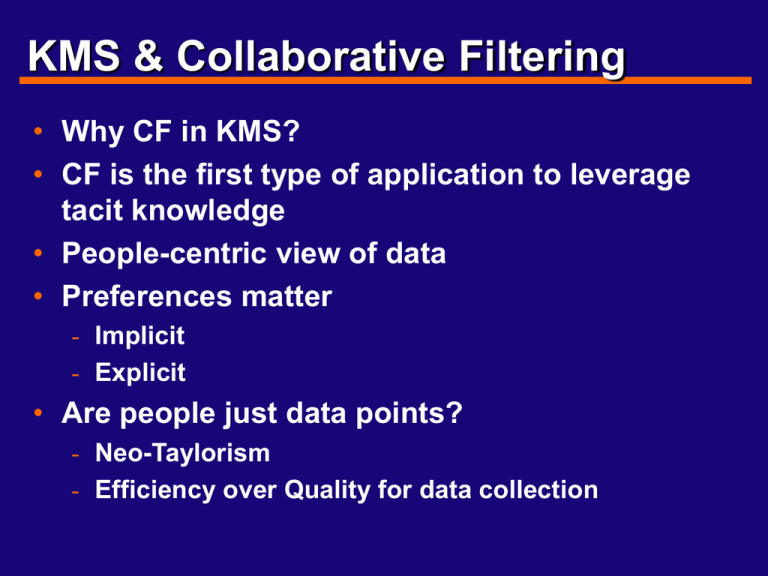
KMS & Collaborative Filtering • Why CF in KMS? • CF is the first type of application to leverage tacit knowledge • People-centric view of data • Preferences matter - Implicit - Explicit • Are people just data points? - Neo-Taylorism - Efficiency over Quality for data collection Community Centered CF • • • • • What is a community? Helping people find new information Mapping community (prefs?) Rating Web pages Recommended Web pages - Measuring recommendation quantity? - Measuring recommendation use • Constant status Community CF • “Personal relationships are not necessary” • What does this miss? • If you knew about the user, would that help with thte cold start problem? • Advisors • Ratings - Population wide - Advisors - Weighted sum • How would an organization use this? Recommender Systems • Broader term than CF, may not be explicitly collaborating • We get recommendations every day • Types of recommendations - Implicit - Explicit • Properties of recommendations - Identity - Experts • Use of recommendations - Aggregation from data - Leveraging naturally occurring factors Recommendation Issues • How do you get people to cooperate? • How good can the recommendations be? - Find things you’d never find? - Step savings, information navigation • Volume of recommendations vs. number of recommendable items? • How accurate can the recommendations be? - Initially - Overall - Over time • What about changing interests? Social (Filtering) Issues • • • • Who controls the sharing? Who controls the controls? “Give to get” systems Anonymity vs. Community - Community of “friends” - People as data points • Free riders • Logrolling and Over-rating Social Filtering • Very dependent on the society (types of users) • Very dependent on the information (Web pages, books, restaurants) • PageRank becomes PersonRank? - Matching your interests and then using it as a filter for both other people and other items? • Person, Document & Time • Extracting Implicit ratings - Reading time, # of accesses - Own, rent, borrow - Amount paid vs. avg cost, time to market Information Filtering & IR • How about filtering, without the collaboration? - Individual preferences - Implicit and Explicit • Text is analyzed - Feature extraction - Recall & precision measures • Vector space identified • Relevance Feedback - Matched with user or rating - Attributes are matched or added to queries Two sides of the same coin? • • • • Filtering is removing data, IR is finding data Dynamic datasets Profile-based - preferences Repeated use of the system, long term interests • Precision & Recall of profiles, not info? • Different needs & motivations • Less interactive than (Web) IR? Tapestry • First system to apply these ideas among a group of people • Email & mailing lists - more email? • Technical proof of concept architecture • Queries - strengths & weaknesses • Annotations are key, the extra information adds to the document for searching and knowing who has already read it • How well do you have to know the other readers/raters? • Difficult to use queries, small document set Active Collaborative Filtering • Getting the community involved • “people looking for information should be able to make use of what others have already found and evaluated” p1 • Allow people to send “pointers” to information to colleagues. - Link to the information with additional contextual information/comments by sharer - Keeps recommendation local - Is supported by social norms (reputation, status) • Lotus Notes • How is it used? - Sharing - Information “digests” - Looking at other’s bookshelves Active CF Advantages • Active Intent by the person who finds and evaluates a document to purposefully share with particular people - Comments are specifically for your friends & co-workers, perhaps specific people - What about for your own re-retrieval or notes? • Better as people find more documents, less of a measure of popularity • Leverages Gatekeeper behavior • Uses “forms, views and databases” (like a list of bookmarks) then adding macros to automate or filter • Online lists, email & private or group databases • Good for smaller groups and smaller document sets Fab • • • • Beyond “black box” content Combining recommendations & content Tastes in the past & future likes Identifies “emerging interests” - • Profiles of content analysis compared - • • • • Group awareness Communication (feedback) Users’ own profile can recommend Relation between users can recommend User profile = multiple interests Content profile = static interest Both may change Items are continually presented to users PHOAKS • • • • Wider group of people (anyone?) Usenet news (more text) Link mining for Web resources What counts as a recommendation? - More than one mention? - Positive & negative? • Fair and balanced for a Community • How do you rank resources? - Weights - Topics Referral Web • Leverage the informal network in an org - Finding help & finding helper context • Using a referral chain to get expert help - Determining expertise by association - Getting help by chain of association • Creates referral network automatically - How about asking? - Neither way is always accurate • Uses existing networks, not help building new ones - Find a friend of a friend - Can be applied to anything people in the group are interested in • Makes relationships visible Social Affordance & Implicit • How can you not use ratings to learn? • Read wear, clicks, dwell time, chatter • Not all resources are as identifiable - Granular- Web pages - Items - commercial products • Web is a shared informaiton space without much sharing • How do incent people to contribute? - Social norms - Rewards Context for Implicit Ratings - • • • • Who When What How (discovery) Web Browsing RSS Reading Blog posting Newsgroup- listserv use Contexts for Explicit Ratings • • • • • Movies Books (Junk) mail eBay transactions Other content Active CF • • • • • Classic paper issues Leveraging what others do Finding what is already found? Take advantage of universal publishing How about filtering, without the collaboration? - Individual preferences - Implicit and Explicit • Is “wisdom” being accumulated? Sharing References • • • • Pointers Packages of Information General flexibility Private and Public resources and ratings Future Issues in Collaboration • It may be more interesting to find a like mind than a resource recommendation - Social Networking - Ad hoc group discussions • Allowing users control over their profile of interests - Over time - Privacy - Difficult to capture interests • Working with diverse content or user interests • Visualization of recommendations & areas
